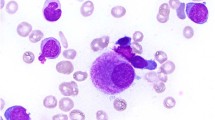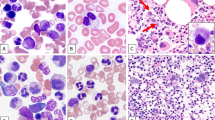Abstract
Monosomal karyotype (MK) refers to the presence of two or more distinct autosomal monosomies or a single monosomy associated with a structural abnormality. In acute myeloid leukemia, MK has been shown to be prognostically worse than an otherwise complex karyotype. The current study examines whether the same holds true for myelodysplastic syndromes (MDS). A total of 127 MDS patients (median age 70 years) with a complex karyotype were considered; 106 (83%) met the above-stipulated criteria for MK and 21 (17%) had a complex karyotype without monosomies. Survival was significantly inferior in patients with MK compared with those with a complex karyotype without monosomies (P=0.01; HR 1.9, 95% confidence interval (95% CI), 1.1–3.3). Multivariable analysis identified MK (P=0.002), advanced age (P=0.0004) and bone marrow blast percentage (0.04) as independent risk factors for survival. There was no difference in survival among MK patients further substratified by the presence or absence of monosomy 7 and/or monosomy 5. Although not statistically significant, leukemia-free survival was also worse with MK compared with complex karyotype without monosomies (P=0.09; HR 2.7, 95% CI 0.8–9.0). MK in MDS identifies a prognostically worse subgroup of patients with a complex karyotype, regardless of whether monosomy 7 or 5 is part of the MK component.
This is a preview of subscription content, access via your institution
Access options
Subscribe to this journal
Receive 12 print issues and online access
$259.00 per year
only $21.58 per issue
Buy this article
- Purchase on Springer Link
- Instant access to full article PDF
Prices may be subject to local taxes which are calculated during checkout




Similar content being viewed by others
References
Haase D, Germing U, Schanz J, Pfeilstocker M, Nosslinger T, Hildebrandt B et al. New insights into the prognostic impact of the karyotype in MDS and correlation with subtypes: evidence from a core dataset of 2124 patients. Blood 2007; 110: 4385–4395.
Pozdnyakova O, Miron PM, Tang G, Walter O, Raza A, Woda B et al. Cytogenetic abnormalities in a series of 1,029 patients with primary myelodysplastic syndromes: a report from the US with a focus on some undefined single chromosomal abnormalities. Cancer 2008; 113: 3331–3340.
Greenberg P, Cox C, LeBeau MM, Fenaux P, Morel P, Sanz G et al. International scoring system for evaluating prognosis in myelodysplastic syndromes. Blood 1997; 89: 2079–2088.
Breems DA, Van Putten WL, De Greef GE, Van Zelderen-Bhola SL, Gerssen-Schoorl KB, Mellink CH et al. Monosomal karyotype in acute myeloid leukemia: a better indicator of poor prognosis than a complex karyotype. J Clin Oncol 2008; 26: 4791–4797.
Medeiros BC, Othus M, Fang M, Roulston D, Appelbaum FR . Prognostic impact of monosomal karyotype in young adult and elderly acute myeloid leukemia: the Southwest Oncology Group experience. Blood. 2010; 116: 2224–2228.
Mitelman F . An International System for Human Cytogenetic Nomenclature. Recommendations of the International Standing Committee on Human Cytogenetic Nomenclature. Karger: Basel, Switzerland, 1995.
Sole F, Espinet B, Sanz GF, Cervera J, Calasanz MJ, Luno E et al. Incidence, characterization and prognostic significance of chromosomal abnormalities in 640 patients with primary myelodysplastic syndromes. Grupo Cooperativo Espanol de Citogenetica Hematologica. Br J Haematol 2000; 108: 346–356.
Vardiman JW, Thiele J, Arber DA, Brunning RD, Borowitz MJ, Porwit A et al. The 2008 revision of the World Health Organization (WHO) classification of myeloid neoplasms and acute leukemia: rationale and important changes. Blood 2009; 114: 937–951.
Sole F, Luno E, Sanzo C, Espinet B, Sanz GF, Cervera J et al. Identification of novel cytogenetic markers with prognostic significance in a series of 968 patients with primary myelodysplastic syndromes. Haematologica 2005; 90: 1168–1178.
Oran B, Dolan M, Cao Q, Brunstein C, Warlick E, Weisdorf D . Monosomal karyotype provides better prognostic prediction after allogeneic stem cell transplantation in AML patients. Biol Blood Marrow Transplant 2010 (Epub ahead of print 26 May 2010).
Author information
Authors and Affiliations
Corresponding author
Ethics declarations
Competing interests
The authors declare no conflict of interest.
Additional information
Supplementary Information accompanies the paper on the Leukemia website
Supplementary information
Rights and permissions
About this article
Cite this article
Patnaik, M., Hanson, C., Hodnefield, J. et al. Monosomal karyotype in myelodysplastic syndromes, with or without monosomy 7 or 5, is prognostically worse than an otherwise complex karyotype. Leukemia 25, 266–270 (2011). https://doi.org/10.1038/leu.2010.258
Received:
Accepted:
Published:
Issue Date:
DOI: https://doi.org/10.1038/leu.2010.258
Keywords
This article is cited by
-
Chronic Myelomonocytic Leukemia: Insights into Biology, Prognostic Factors, and Treatment
Current Oncology Reports (2019)
-
TP53 mutation status divides myelodysplastic syndromes with complex karyotypes into distinct prognostic subgroups
Leukemia (2019)
-
Mutations and karyotype in myelodysplastic syndromes: TP53 clusters with monosomal karyotype, RUNX1 with trisomy 21, and SF3B1 with inv(3)(q21q26.2) and del(11q)
Blood Cancer Journal (2017)
-
Cytogenetic and molecular abnormalities in chronic myelomonocytic leukemia
Blood Cancer Journal (2016)
-
Chronic Myelomonocytic Leukemia: a Genetic and Clinical Update
Current Hematologic Malignancy Reports (2015)



